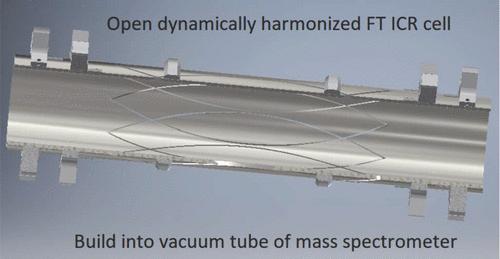
Credit: Evgeny Nikolaev and Anton Lioznov/Skoltech
Mass spectrometers are widely used to analyze highly complex chemical and biological mixtures. Skoltech scientists have developed a new version of a mass spectrometer that uses rotation frequencies of ionized molecules in strong magnetic fields to measure masses with higher accuracy (FT ICR). The team has designed an ion trap that ensures the utmost resolving power in ultra-strong magnetic fields. The research was published in the journal Analytical Chemistry.
The ion trap is shaped like a cylinder made up of electrodes, with electric and magnetic fields generated inside. The exact masses of the test sample’s ions can be determined from their rotation frequencies. The electrodes must create a harmonized field of a particular shape such that the ions rotate predictably. A trap with such a field is called a Dynamically Harmonized Cell (DHC).
The DHC was invented in 2011 by Evgeny Nikolaev, a Professor at the Skoltech Center for Computational and Data-Intensive Science and Engineering (CDISE). Although in reality, the cell’s field is of a highly complex nature and is not harmonized, for fast rotating ions in the magnetic field it still appears as harmonized due to the averaging effect, hence the cell’s name. So far, the best trap in terms of spectrum measurement accuracy, the DHC has been widely used in research and commercial mass spectrometers with a high demand on accuracy and integrated into the strongest magnetic field mass spectrometer at the National High Magnetic Field Laboratory in Tallahassee, FL.
Super strong magnets cost tens of millions of dollars. Mass measurement accuracy is supposed to increase linearly with magnetic field strength, but it does not: in reality, the pattern is non-linear, and the increase in accuracy is much slower than expected.
The scientists assumed that non-linearity occurs because the level of vacuum in the cell is not sufficient, no matter how advanced are the pumps. They developed a trap with both ends open for easy evacuation of residual gases and named it the ‘Zig-Zag Cell’.
“Right now, our lab is manufacturing the new cell which we will use for experiments to check whether our assumptions and theoretical predictions are correct, and if they are, the trap will put the linear relationship between mass spectrum measurement accuracy and magnetic field strength back in place, thus ensuring higher accuracy at very high values of magnetic field strength. The fact that the accuracy increases with an increase in magnetic field strength means that the trap will potentially help create the most accurate mass spectrometer of all,” says Anton Lioznov, a PhD student at Skoltech.
According to the study lead, Professor Evgeny Nikolaev, mass spectrometers with a new type of cell will ensure higher accuracy for biological samples and complex mixtures, such as oil, where even existing mass spectrometers of this type with the DHC can detect up to 400,000 compounds.
###
Skoltech is a private international university located in Russia. Established in 2011 in collaboration with the Massachusetts Institute of Technology (MIT), Skoltech is cultivating a new generation of leaders in science, technology, and business researching breakthrough fields. It is promoting technological innovation intending to solve critical problems that face Russia and the world. Skoltech is focusing on six priority areas: data science and artificial intelligence, life sciences, advanced materials and modern design methods, energy efficiency, photonics, and quantum technologies, and advanced research. Web: https:/
Media Contact
Ilyana Zolotareva
[email protected]
Related Journal Article
http://dx.




